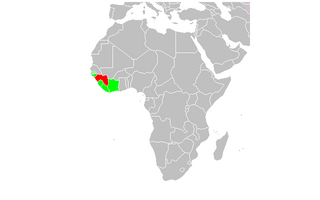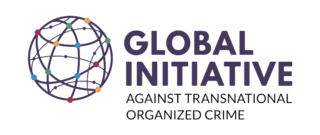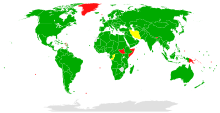
People smuggling, under U.S. law, is "the facilitation, transportation, attempted transportation or illegal entry of a person or persons across an international border, in violation of one or more countries' laws, either clandestinely or through deception, such as the use of fraudulent documents".

The United Nations Office on Drugs and Crime is a United Nations office that was established in 1997 as the Office for Drug Control and Crime Prevention by combining the United Nations International Drug Control Program (UNDCP) and the Crime Prevention and Criminal Justice Division in the United Nations Office at Vienna. and was renamed the United Nations Office on Drugs and Crime in 2002.

Antonio Maria Costa is an Italian economist. He lives in Vienna and Brussels.

Commercial sexual exploitation of children (CSEC) is a commercial transaction that involves the sexual exploitation of a child, or person under the age of consent. CSEC involves a range of abuses, including but not limited to: the prostitution of children, child pornography, stripping, erotic massage, phone sex lines, internet-based exploitation, and early forced marriage.
The Protocol against the Smuggling of Migrants by Land, Sea and Air, supplementing the Convention against Transnational Organised Crime, was adopted by the United Nations General Assembly in 2000. It is also referred to as the Smuggling Protocol. It is one of the three Palermo protocols, the others being the Protocol to Prevent, Suppress and Punish Trafficking in Persons, especially Women and Children and the Protocol against the Illicit Manufacturing and Trafficking in Firearms, Their Parts and Components and Ammunition.
The Protocol to Prevent, Suppress and Punish Trafficking in Persons, Especially Women and Children is a protocol to the United Nations Convention against Transnational Organized Crime. It is one of the three Palermo protocols, the others being the Protocol against the Smuggling of Migrants by Land, Sea and Air and the Protocol against the Illicit Manufacturing of and Trafficking in Firearms.

Transnational organized crime (TOC) is organized crime coordinated across national borders, involving groups or markets of individuals working in more than one country to plan and execute illegal business ventures. In order to achieve their goals, these criminal groups use systematic violence and corruption. Common transnational organized crimes include conveying drugs, conveying arms, trafficking for sex, toxic waste disposal, materials theft and poaching.
The Palermo protocols are three protocols that were adopted by the United Nations to supplement the 2000 Convention against Transnational Organized Crime. They are:

Human trafficking is the trade of humans for the purpose of forced labour, sexual slavery, or commercial sexual exploitation for the trafficker or others. This may encompass providing a spouse in the context of forced marriage, or the extraction of organs or tissues, including for surrogacy and ova removal. Human trafficking can occur within a country or trans-nationally. Human trafficking is a crime against the person because of the violation of the victim's rights of movement through coercion and because of their commercial exploitation. Human trafficking is the trade in people, especially women and children, and does not necessarily involve the movement of the person from one place to another.
Child migration or "children in migration or mobility" is the movement of people ages 3–18 within or across political borders, with or without their parents or a legal guardian, to another country or region. They may travel with or without legal travel documents. They may arrive to the destination country as refugees, asylum seekers, or economic migrants.

The West Africa Coast Initiative is an attempt from the United Nations to combat the fight against drug trafficking and transnational organized crime in West Africa. Initially,
The United Nations Global Initiative to Fight Human Trafficking (UN.GIFT) is a multi-stakeholder initiative providing global access to expertise, knowledge and innovative partnerships to combat human trafficking.

Human trafficking is a crime in New Zealand under Section 98D of the Crimes Act 1961. In 2002, the New Zealand Government ratified the Protocol to Prevent, Suppress and Punish Trafficking in Persons, especially Women and Children, a protocol to the United Nations Convention against Transnational Organized Crime (UNTOC). New Zealand participates in efforts to combat human trafficking in the Asia-Pacific region, and has a leadership role in the Bali Process on People Smuggling, Human Trafficking and related Transnational Crime.

The Blue Heart Campaign is an international anti-trafficking program started by the United Nations Office on Drugs and Crime (UNODC). Established in 1997, the UNODC supported countries in implementing three UN drug protocols. In 2000, after the UN General Assembly adopted the Protocol to Prevent, Suppress and Punish Trafficking in Persons, the UNODC became the “guardian” of that protocol and assumed the functions of fighting against human trafficking. The Blue Heart Campaign was launched in March 2009 by the Executive Director of the UNODC, Antonio Maria Costa, during his address to the World's Women's Conference meeting in Vienna. The campaign's symbol is a blue heart. The Blue Heart Campaign uses its website, as well as Facebook, Twitter, YouTube, and Flickr to communicate goals, objectives, and news with the public.
The Protocol against the Illicit Manufacturing and Trafficking in Firearms, Their Parts and Components and Ammunition is a treaty on anti-arms trafficking including Small Arms and Light Weapons that is supplemental to the Convention against Transnational Organized Crime. It is one of the so-called Palermo protocols.

Maria Grazia Giammarinaro is an Italian judge and policy-maker.
Human Trafficking or "trafficking in persons" is the recruiting, harboring, transporting, providing, or obtaining a person for mainly the purposes of forced labor or prostitution. However, other reasons for human trafficking is for the removal of organs, forced marriage, and other exploitations. South America is one of the biggest source and destination locations in the world and has struggled with the issue for many years. The ILO estimates that of the 20.9 million victims of human trafficking in 2012, 1.8 million were from Latin America. There are many factors that cause human trafficking, like a high demand for domestic servants, sex laborers, and factory workers, the existence of already established trafficking networks that often take advantage of young women and children, corruption in the governments and local law enforcement agencies, a governmental disinterest in the issue and a lack of opportunity for women in South American regions where trafficking occurs. People who are typically exploited in human trafficking are impoverished, a member of an indigenous people, unemployed, victim of some kind of abuse, illiterate, substance users, is homeless and/or associated to gang activity. Research done by United States Department of State has also stated that there is a vulnerability for the LGBTQ+ and transgender people to be caught up in human trafficking. By far, sex trafficking is the leading type of human trafficking, making up 79 percent of all human trafficking. This is then followed by forced labor at 18 percent. About 20 percent of trafficking victims are children. Primary destinations for trafficking and illegal immigration are the United States, Spain, Britain, Italy, the Netherlands, Portugal, and Canada. Globalization, capitalism and societal attitudes facilitates and reduces the barriers to human trafficking in the world today.
Maritime drug smuggling into Australia refers to the smuggling of illicit drugs into Australia by sea. While much contemporary Australian media coverage has focused on smaller, more personalised smuggling cases such as the Bali Nine, maritime drug smuggling often allows criminal groups to move illicit drugs and substances into Australia at a much greater scale. This has happened through a variety of ways, including via cargo ship, yacht, and fishing vessels. Key departure locations for drugs aimed to be smuggled into Australia include China, India, Southeast Asia, and the Americas, with much of the drugs trafficked via countries and territories in the South Pacific, in close proximity to Australia.

The Global Initiative Against Transnational Organized Crime, sometimes shortened as Global Initiative, is an international non-governmental organization headquartered in Geneva. The organisation is composed of a network of law enforcement, governance and development practitioners, who share the objective of developing innovative strategies and responses to organized crime. In July 2020, the network counted 500 experts.
Zhao Wei is a Chinese gangster and the founder of Hong Kong-registered company Kings Romans Group, which owns the Kings Romans casino franchise. The United States Treasury Department imposed sanctions on the Zhao Wei Transnational Criminal Organization in 2018 for its involvement in laundering money and assisting in the storage and distribution of heroin, methamphetamine, and other narcotics for illicit networks, including the United Wa State Army which operates in Myanmar. Based in Laos in the Golden Triangle Special Economic Zone (GTSEZ), Zhao Wei is also reported to engage in human trafficking, bribery, wildlife trafficking, and other forms of transnational organized crime. Much of this illicit activity is conducted through the Kings Romans casino organisation in the GTSEZ.










